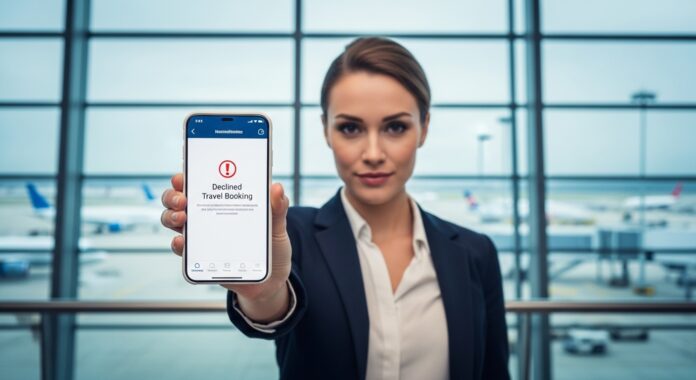A declined booking typically results from issuer‑level refusals, Strong Customer Authentication requirements under PSD2/3‑D Secure, or strict address/CVV rules causing AVS/CVV mismatch decline codes – each with a distinct, fixable path to completion. The sections below map common credit card declined travel booking reasons to the exact next step that reliably converts the transaction without unnecessary retries.
Quick diagnosis checklist
- Error mentions “authentication required,” “3‑D Secure,” or “challenge” → perform 3DS/SCA and retry once after successful authentication.
- Messages like “CVC declined,” “incorrect postal code,” or “AVS failed” → re‑enter billing address exactly as on statement and the correct CVV/CVC, then attempt a single retry.
- “Do_not_honor,” “issuer_unavailable,” or “restricted_card” → call issuer to clear flags/limits, then retry once with 3DS or use a device wallet that satisfies SCA.
- Rapid back‑to‑back attempts already made → pause to avoid velocity declines and temporary challenge lockouts before making one corrected attempt.
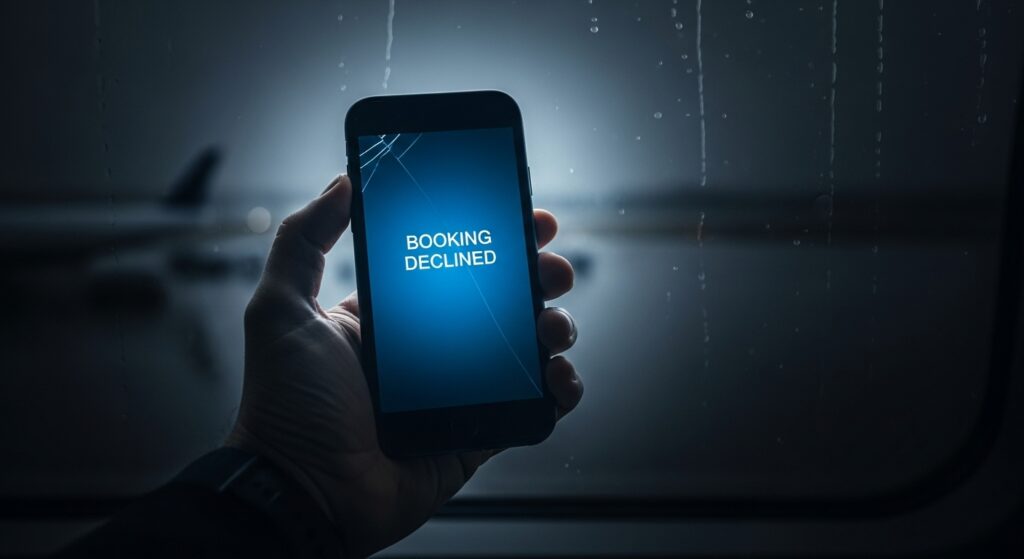
Core concepts behind declines
Issuer declines happen when the bank refuses authorization due to generic “do not honor,” insufficient funds, expired/blocked card, or policy/risk reasons, and only the issuer can disclose the precise basis and remove a block. SCA/3‑D Secure is mandated in the EEA for most e‑commerce card payments; skipping or failing SCA often yields a soft decline that is resolved by authenticating via 3DS or using a wallet that already meets SCA. AVS/CVV checks compare input data to issuer records; mismatches can trigger hard declines when merchants enforce strict address and CVV rules, which are fixed by exact data entry and a single controlled retry.
Step‑by‑step recovery playbook
- Identify decline class: look for “authentication required,” “AVS/CVV mismatch,” or issuer phrases like “do_not_honor/issuer_unavailable,” which dictate the next action flow.
- For “authentication required”: switch to a 3‑D Secure flow or device wallet (Apple Pay/Google Pay) to satisfy SCA with possession plus biometric/PIN and retry once.
- For AVS CVV mismatch decline codes: re‑type the billing address exactly as on the card statement (including postal code formatting) and the correct CVV/CVC, then retry once.
- For issuer “do_not_honor/refer_to_issuer/issuer_unavailable”: contact the bank to lift fraud flags, enable e‑commerce/cross‑border, or confirm limits; then perform a single 3DS‑backed retry.
- If the card is expired/blocked/lost/stolen: switch to a valid card or a wallet token tied to an active card to proceed securely.
- Avoid rapid successive attempts: velocity filters and 3DS lockouts can be triggered; wait, correct the cause, then retry once.
- If duplicate‑payment warnings appear: check whether a successful authorization already exists before trying again.
- For currency or unsupported‑transaction errors: use the card’s supported currency or a method the issuer permits for CNP travel bookings.
- Prefer authenticated wallets in PSD2 regions: device wallets often raise issuer confidence and frictionlessly meet SCA, improving approval rates.
- Document the exact decline message: the code or phrase dictates the fastest conversion path and prevents unnecessary retries that resemble fraud automation.
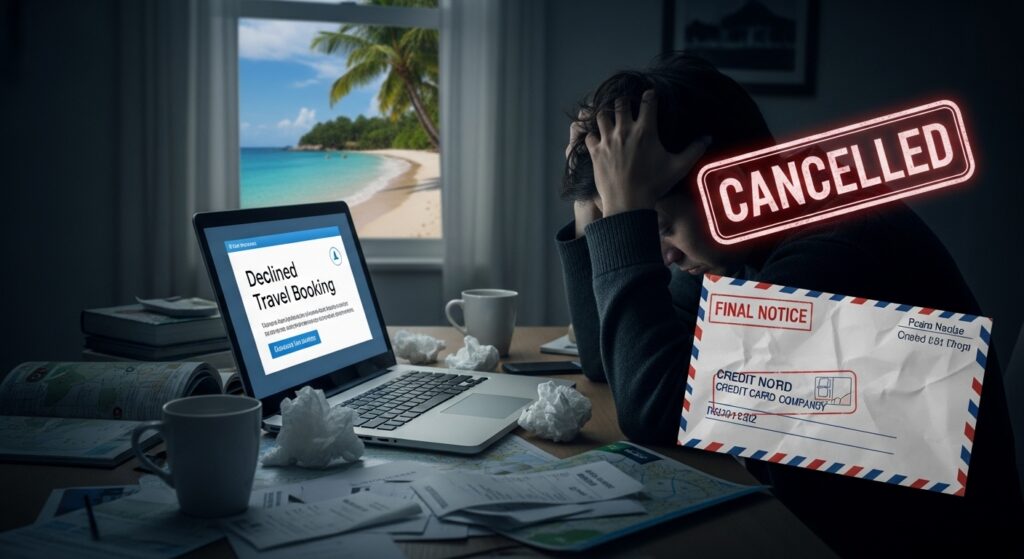
Credit card declined travel booking reasons: precise fixes
Issuer generic refusal (“do_not_honor”) indicates an issuer decision without shared details; clearing the flag requires an issuer call followed by a single 3DS‑authenticated retry to convert. “issuer_unavailable” or network issues suggest temporary connectivity limits at the bank; a delayed reattempt or alternate method usually proceeds after availability returns. “insufficient_funds/over_limit/withdrawal_count_limit_exceeded” requires funding or a card with adequate available credit before a single retry.
SCA and 3‑D Secure: mandatory in many EEA scenarios
Under PSD2, most EEA e‑commerce card payments require Strong Customer Authentication, and many “soft declines” simply request a retry with 3‑D Secure to pass issuer checks. EMV® 3‑D Secure enables possession plus knowledge/biometric factors across web and app flows, reducing fraud and raising authorization confidence when properly implemented. Exemptions exist (for example, low‑value or transaction risk analysis), but issuers can still demand authentication, and a 3DS challenge resolves those soft declines.
AVS CVV mismatch decline codes: What they mean and how to fix
AVS compares street/number/postal code to issuer records; merchants can auto‑decline mismatches to reduce card‑not‑present risk, so precise statement‑matching inputs are essential. CVV/CVC responses flag mismatched security codes; entering the correct code from the physical card is the only reliable fix before a single retry. When both AVS and CVV are enforced, correcting address formatting and CVV together prevents repeated hard declines and unnecessary velocity escalation.
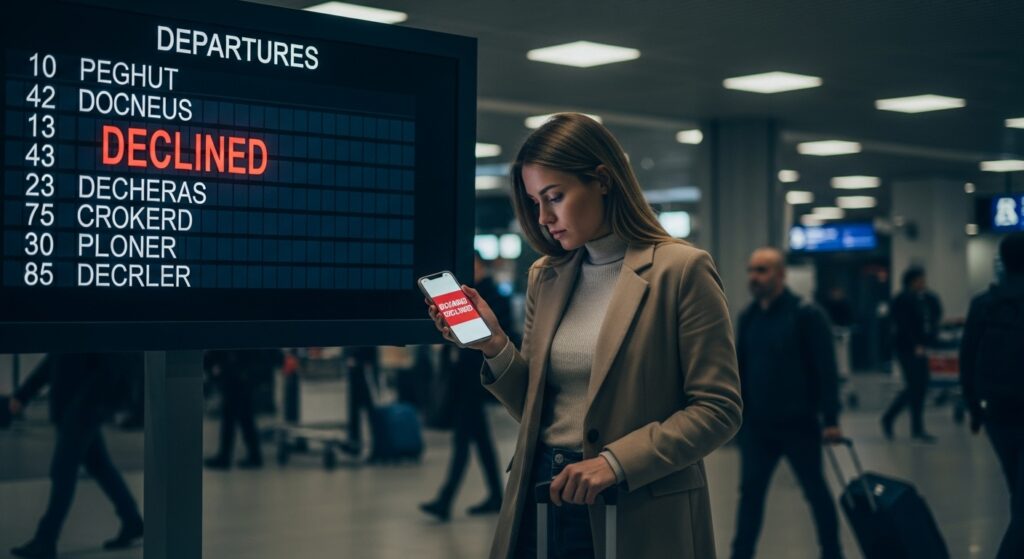
Error‑specific solutions that convert
- authentication_required/3DS needed: complete the 3DS challenge or switch to a wallet that embeds SCA; then retry once.
- incorrect_cvc/incorrect_zip/incorrect_address: re‑enter exact statement address and the correct CVC; then attempt a single retry to avoid risk throttling.
- do_not_honor/refer_to_issuer: only issuer support can clear; after confirmation, use 3DS or a wallet to increase approval probability.
- issuer_unavailable/processing_error: wait and retry later once; if persistent, use an alternate method or card to bypass transient network issues.
- lost_stolen/restricted_card: switch to a different card or wallet tokenized to an active card; do not keep retrying the blocked credential.
- duplicate_transaction: check the last successful charge to avoid unintentional double booking before any new attempt.
- velocity_exceeded/many rapid retries: pause to reset risk scoring; correct root cause and make one controlled, authenticated attempt.
Methods that raise approval odds
Device wallets (Apple Pay/Google Pay) satisfy SCA by design and often improve issuer confidence and approval under PSD2 without adding extra user steps in checkout. Proper EMV® 3DS flows (web or in‑app) deliver the required two factors, reduce fraud liability exposure, and prevent soft declines from stalling the booking.
Fraud alerts vs. payment fraud filters
A credit‑file fraud alert instructs lenders to verify identity for new credit; it does not itself block ordinary card‑not‑present purchases on existing accounts. Booking declines generally come from issuer fraud systems or merchant risk rules on the transaction, which must be cleared via 3DS authentication, corrected data, or issuer approval—not by altering a credit‑bureau alert.
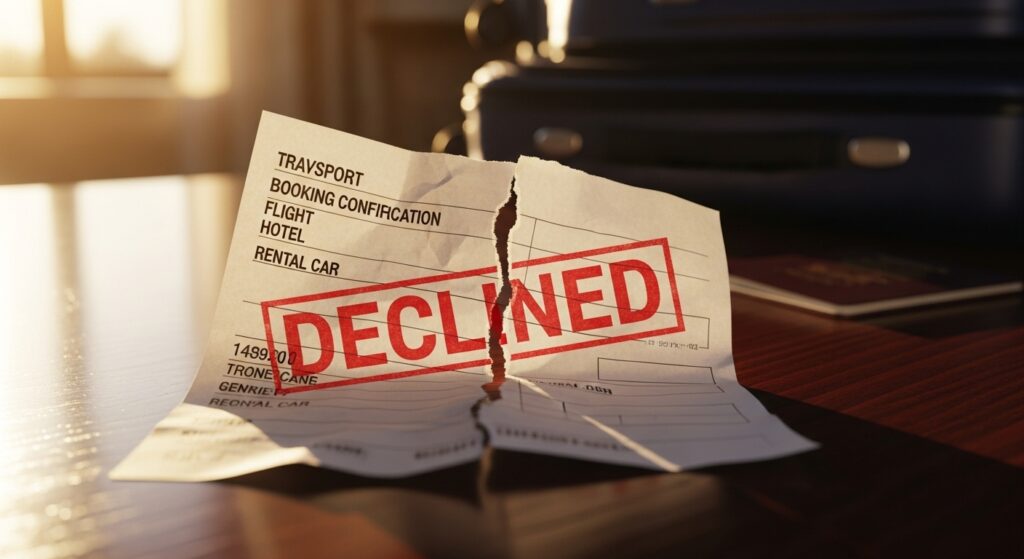
Minimal‑retry rule to avoid risk blocks
Card networks and issuers can throttle or penalize repeated attempts; excessive retries increase false‑positive risk and may trigger velocity declines or temporary authentication lockouts. The high‑conversion pattern is: fix one clear cause, run one authenticated retry, and stop if it fails pending issuer or merchant guidance.
Airline/OTA/hotel nuances that matter
In travel, strong authentication (3DS/SCA) reduces card‑not‑present fraud exposure and increases the likelihood that authorized tickets or reservations won’t be canceled due to downstream chargebacks. If an OTA flow declines due to gateway risk, a direct airline or property flow with 3DS often changes risk posture and secures approval with liability protections aligned to authentication success.
Prevention checklist before the next booking
- Use exact statement billing address and the card’s physical CVV to avoid AVS/CVV‑driven refusals.
- Prefer 3DS‑capable flows or device wallets for EEA bookings to meet SCA quietly and preempt soft declines.
- Avoid rapid retries; correct the root cause, then make one authenticated attempt to prevent velocity‑based declines.
- Keep a second, active card or compliant wallet available for cross‑border CNP transactions to bypass issuer policy limits.
FAQs: fast answers
What are the most common credit card declined travel booking reasons?
Issuer‑level refusals (do_not_honor, insufficient_funds, expired/blocked), SCA/3‑D Secure not completed under PSD2, and AVS/CVV mismatches account for most denials in travel e‑commerce. Correcting inputs, authenticating with 3DS, or clearing issuer fraud flags resolves the majority with a single controlled retry.
How to recognize a soft decline vs. hard decline?
Soft declines reference authentication or SCA—terms like “authentication_required” or prompts to challenge—while hard declines cite incorrect data, invalid card, or issuer policy; soft declines convert after 3DS whereas hard declines require data correction or issuer intervention. Matching the message to the fix prevents unnecessary retries and reduces velocity risk.
What fixes AVS CVV mismatch decline codes instantly?
Re‑enter the exact statement address (street and postal code formatting) and type the correct CVV from the physical card, then retry once to avoid repeated hard declines. Strict merchant rules auto‑decline mismatches, so precision is mandatory to pass gateway checks.
What does “do_not_honor” mean during a travel checkout?
It’s a generic issuer refusal without details; only the issuer can disclose and remove the restriction, after which a single 3DS‑backed retry is recommended. Avoid repeated attempts before contacting the bank to prevent velocity flags.
Are Apple Pay/Google Pay better for EEA bookings?
Yes, device wallets inherently meet SCA and often secure higher approval rates under PSD2 with less friction than manual 3DS prompts. They also reduce data entry errors behind AVS/CVV declines by tokenizing credentials.
Why did the card work on one site but fail on another?
Gateways apply different fraud thresholds, AVS/CVV rules, and SCA handling; a combination that passes at one merchant can fail at another until authentication or data corrections are applied. Use 3DS or a wallet to align with stricter risk controls and complete the booking.
Should retries be made immediately after a decline?
No; pause to fix the exact issue and avoid triggering velocity filters or 3DS lockouts before a single authenticated retry. This pattern maximizes approval probability and minimizes risk scoring.
Does a credit‑bureau fraud alert block a hotel or flight payment?
No; fraud alerts prompt identity verification for new credit lines and do not directly block card‑not‑present purchases on existing accounts. Travel booking declines are resolved via issuer authorization, SCA, and accurate AVS/CVV—not by removing a bureau alert.
What if the decline says “issuer_unavailable”?
This reflects issuer connectivity or availability limits; waiting and retrying once, or switching to an alternate method, typically resolves the issue. Avoid multiple rapid attempts during outages to prevent additional risk flags.
Do duplicate attempt warnings mean the first payment succeeded?
Often yes; check the most recent successful authorization before retrying to avoid double booking or duplicate settlement. Gateways flag identical amount/card submissions within short windows for protection.
Can 3DS versions affect approval rates?
Modern EMV® 3DS versions improve data sharing and authentication experiences across devices, helping issuers approve legitimate transactions more consistently. Keeping flows current with EMV® 3DS guidance supports both security and conversion.
What is the best single action to convert a soft decline in the EEA?
Complete a 3‑D Secure challenge or pay with a device wallet that satisfies SCA, then retry once after successful authentication. This directly addresses issuer requirements under PSD2.
Copy‑and‑apply resolution paths (concise)
- Soft decline (authentication_required) → run 3DS or use a device wallet; then single retry.
- AVS/CVV mismatch → re‑enter exact billing address and correct CVV; single retry.
- Issuer generic refusal (do_not_honor) → call issuer to clear; single 3DS‑backed retry.
- Insufficient funds/over limit → use funded card; single retry.
- Issuer network unavailable → delayed retry or alternate method; avoid rapid attempts.
Bottom line
Most declines at travel checkout convert by authenticating with 3‑D Secure, correcting AVS/CVV data, or clearing issuer fraud blocks – performed once, not repeatedly, to avoid velocity penalties and lockouts. Apply the mapped fix for the exact message shown, then execute a single, controlled reattempt to secure authorization and complete the booking.
